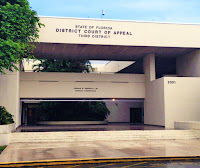Second or "Re-Opened" Appraisal Not Permitted Where Law and Ordinance Issue Arose Subsequent to Appraisal Award
In the matter of Noa v. Fla. Ins. Guar. Ass'n, 215 So. 3d 141 (Fla. 3d DCA 2017), Florida's 3d DCA affirmed the trial court's order denying an insured a second appraisal of damaged property pursuant to a property insurance contract.
Prior to suit, the insurance claim (a 2005 Hurricane Wilma windstorm claim involving roof damage) had resulted in an undisputed payment followed by demand for appraisal. The appraisal award provided payment for 3% of the roof. Less than a month after the appraisal award was entered and paid, the insured's roofer submitted a permit application to the Miami-Dade building and zoning authority for repair of 30% of the roof. The roofing permit was denied. Florida Building Code and Miami-Dade County Building Code prohibit repair to more than 25% of the roof. In such a situation, an entire roof replacement would be required.
Following denial of the permit application, the insured and the roofing contractor entered into a contract for $26,000 to replace the entire roof, and the insured submitted the contract to the insurance company and requested the additional amount be paid under the law and ordinance provision of the insurance contract. The insurance company denied the request for supplemental payment and took the position that the prior appraisal resolved all issues. The insured filed suit and requested that the appraisal be "re-opened" for the purpose of demonstrating that more than 25% of the total roof area had been damaged triggering the need to replace the entire roof. The trial court judge denied the request and an appeal ensued.
Florida's 3rd DCA affirmed the decision of the trial judge. The appellate court concluded a re-opened appraisal under this set of facts would defeat and supersede the appraisal award:
To hold otherwise would allow the insured's post-appraisal roofing contractor to step into the adjustment process as a super-umpire whose opinion supersedes the appraisal and requires a new round of valuation estimates.In reaching its decision, the 3rd DCA articulated a previously unstated standard for competent performance as an insurance property appraiser:
In order to perform competently as an appraiser for this purpose, and to be designated by a party or by other appraisers or the court (as an umpire), logic and common sense require that an appraiser must have experience in the estimation of materials and labor costs for the repair and replacement of damaged property. In the case of roof work, appraisers must consider the requirements of the applicable building codes in order to estimate the cost of repair or replacement. This is an area for professional construction industry expertise and should be "baked into" the appraisers' and umpire's computations, and not left open for a re-appraisal or for a determination by the court.
The bottom line decided by the court was that the appraisal award was final. No second or re-opened appraisal was permitted, and the findings of the appraisal panel were binding on the insured. This result makes clear that every insured should be prepared to go into an appraisal with full knowledge of what the actual cost to repair or replace the property will total, and to have a competent appraiser with full knowledge of the applicable building codes prepared to present the insured's position to the umpire.
Click for Full Opinion.

Comments
Post a Comment